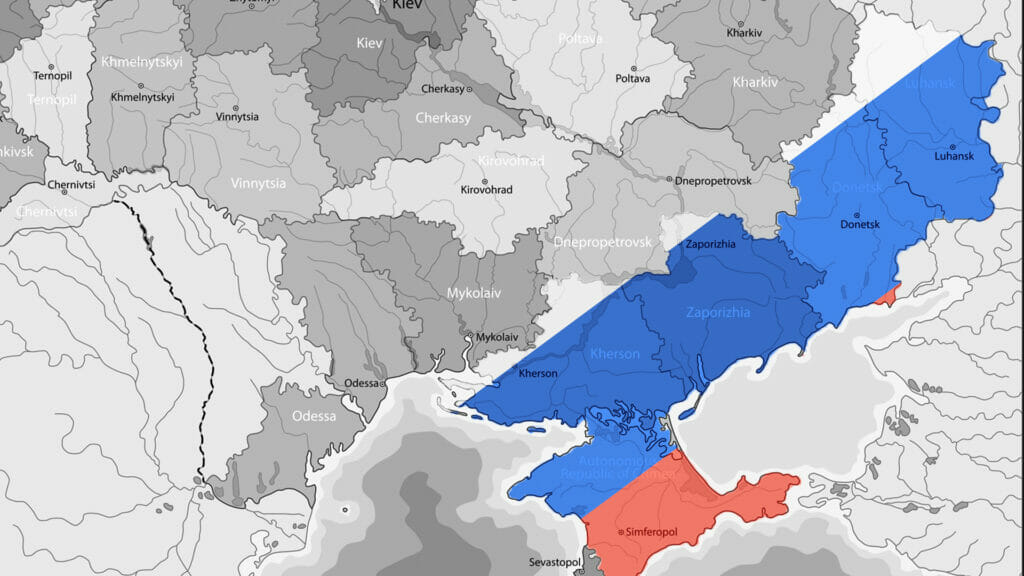Following Russia’s annexation of four Ukrainian states, the European Union convened to implement its eighth package of restrictions and embargos against Russia, which finalized today.

The procedures began on September 28th, where Josep Borrell, High Representative for Foreign Affairs and Security Policy, ‘further declared that the Union and its Member States will continue to support Ukraine’s efforts to this end, as long as necessary,’ the EU press release explained.
Germany’s Foreign Minister has also explicitly stated that she and the government will seek to put Ukraine’s needs ahead of her own German people.
This new sanctions package against Russia is proof of our determination to stop Putin’s war machine and respond to his latest escalation with fake “referenda” and illegal annexation of Ukrainian territories.
We are further hitting Russia’s war economy, limiting Russia‘s import/export capacities and are on the fast-track to liberate ourselves from Russian energy dependence. We are also targeting those responsible for the illegal annexation of Ukrainian territories.
The EU will stand by Ukraine for as long as it takes.
Boreell said
The EU provided a list of things included in this new package (emphasis not mine):
The package agreed today introduces into the EU legislation the basis to put in place a price cap related to the maritime transport of Russian oil for third countries and further restrictions on the maritime transport of crude oil and petroleum products to third countries.
Concretely, the combination of these measures works as follows. It will be prohibited to provide maritime transport and to provide technical assistance, brokering services or financing or financial assistance, related to the maritime transport to third countries of crude oil (as of December 2022) or petroleum products (as of February 2023) which originate in or are exported from Russia. The price cap derogation would allow the provision of the transport and these services if the oil or petroleum products are purchased at or below a pre-established price cap. The new prohibition for EU vessels to provide maritime transport for such products to third countries will apply as of the date in which the Council will unanimously decide to introduce the price cap. The price cap will drastically reduce the revenues Russia earns from oil after its illegal war on Ukraine has inflated global energy prices. The oil price cap can also serve to stabilise global energy prices.
As concerns trade, the EU is extending the import ban on steel products that either originate in Russia or are exported from Russia. Further import restrictions are also imposed on wood pulp and paper, cigarettes, plastics and cosmetics as well as elements used in the jewellery industry such as stones and precious metals, that altogether generate significant revenues for Russia. The sale, supply transfer or export of additional goods used in the aviation sector will also be restricted.
The package agreed today also comprises:
- the sanctioning of individuals and entities that have played a role in the organisation of illegal “referenda”, representatives of the defence sector, and well-known persons spreading disinformation about the war. The Council also decided to broaden the listing criteria on which specific designations can be based, in order to include the possibility to target those who facilitate the circumvention of EU sanctions
- the extension of the list of restricted items which may contribute to Russia’s military and technological enhancement or the development of its defence and security sector. The list will now include certain electronic components, additional chemicals and goods that can be used for capital punishment, torture or other cruel, inhuman or degrading treatment
- a prohibition to sell, supply, transfer or export civilian firearms and their essential components and ammunition, military vehicles and equipment, paramilitary equipment, and spare parts
- a ban on EU nationals to hold any posts on the governing bodies of certain Russian state-owned or controlled legal persons, entities or bodies
- the insertion in the list of state-owned entities that are subject to the transaction ban of the Russian Maritime Shipping Register, a 100% State-owned entity which performs activities related to the classification and inspection, including in the field of security, of Russian and non-Russian ships and crafts
- a full ban of the provision of crypto-asset wallet, account or custody services to Russian persons and residents, regardless of the total value of those crypto-assets
- the prohibition to provide architectural and engineering services as well as IT consultancy services and legal advisory services to Russia
The Council also decided that as of today, the geographical scope of the restrictions introduced on 23 February, including notably the import ban on goods from the non-government controlled areas of the Donetsk and Luhansk oblasts, will be extended to cover also the non-controlled areas of the oblasts of Zaporizhzhia and Kherson.
The relevant legal acts will soon be published in the Official Journal.
AUTHOR COMMENTARY
‘Ah yes, your last seven packages worked so ‘wonderfully,’ so an eighth should do the trick to stop Putin!’ I am being sarcastic of course.
[6] He that sendeth a message by the hand of a fool cutteth off the feet, and drinketh damage. [17] He that passeth by, and meddleth with strife belonging not to him, is like one that taketh a dog by the ears.Proverbs 26:6, 17
These idiots are bound and determined to further harm their own people, “as long as it takes,” they say. Of course, not a single one of these psychos cared when Russia was performing operations in Ukraine since 2014; or how Ukraine routinely kills their own people, women and children included, by Nazi militia groups, and are even praised by their god Zelensky.
Zelensky Praises Neo-Nazi Asov Battalion Soldiers Who Kill Their Own People
Russia will just trade more with their Eastern allies, as they already have been, so this will not hurt them very much if not at all in the long term.
Moreover, it should be noted that some of these restrictions slammed on Russian imports also coincide with some of their climate agendas:
There are currently no freight ships operating without emissions, so shipping must contract [by 2030].
Reduced demand for iron ore and limestone as blast furnace iron and cement reduces. Increased demand for materials for electrification [by 2030].
Steel recycling grows while cement and blast furnace iron reduce; some plastics with process emissions reduce [by 2030]. [Afterwards], Cement and new steel phased out along with emitting plastics. Steel recycling grows. Aluminum, paper reduced with energy supply.
Material efficiency becomes prominent as material supply contracts [by 2030]/ Most goods made with 50% as much material, many now used for twice as long [by 2050].
Rapid reduction in supply and use of all fossil fuels, except for oil for plastic production [by 2030].
[7] Who goeth a warfare any time at his own charges? who planteth a vineyard, and eateth not of the fruit thereof? or who feedeth a flock, and eateth not of the milk of the flock? [8] Say I these things as a man? or saith not the law the same also? [9] For it is written in the law of Moses, Thou shalt not muzzle the mouth of the ox that treadeth out the corn. Doth God take care for oxen? [10] Or saith he it altogether for our sakes? For our sakes, no doubt, this is written: that he that ploweth should plow in hope; and that he that thresheth in hope should be partaker of his hope. (1 Corinthians 9:7-10).
The WinePress needs your support! If God has laid it on your heart to want to contribute, please prayerfully consider donating to this ministry. If you cannot gift a monetary donation, then please donate your fervent prayers to keep this ministry going! Thank you and may God bless you.







